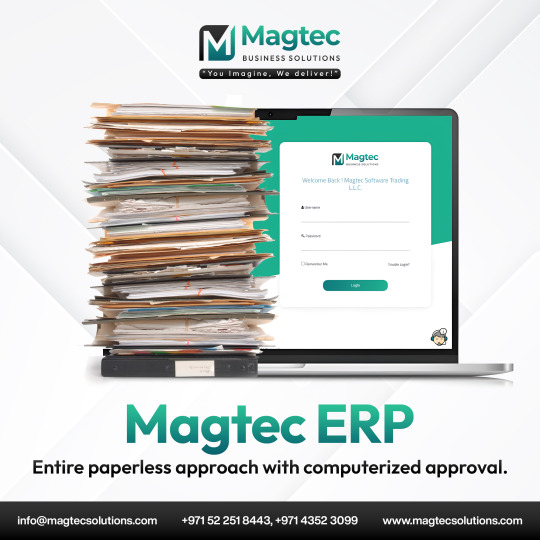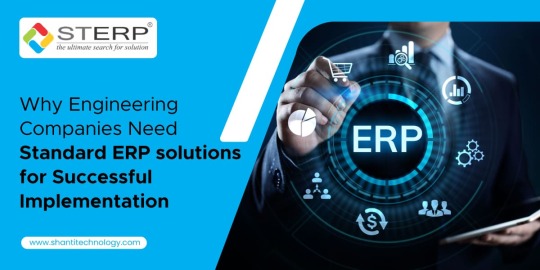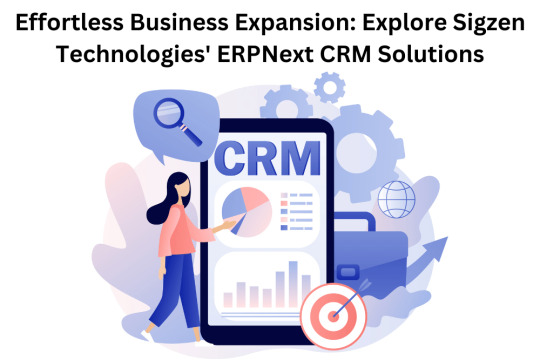#erp solutions for automating workflows
Explore tagged Tumblr posts
Text
ERP Systems with AI Integration - Revolutionizing Business Management
Enterprise Resource Planning (ERP) systems have long been the backbone of modern business management, helping organizations streamline operations, manage resources, and gain insights into their processes. With the advent of Artificial Intelligence (AI), ERP software is undergoing a transformative upgrade. The integration of AI into ERP systems offers a new era of efficiency, accuracy, and innovation for businesses across industries.
What are ERP Systems?
ERP systems are software platforms designed to manage and integrate core business processes such as finance, human resources, supply chain, manufacturing, and customer relationship management (CRM). Traditionally, this software consolidates data into a centralized database, enabling better coordination and decision-making.
How AI Enhances ERP Systems
AI brings a range of capabilities to ERP tool, enhancing their functionality in several ways:
1. Predictive Analytics
AI enables ERP software to analyze historical data and predict future trends. For example:
Demand Forecasting: AI can predict product demand, allowing businesses to optimize inventory levels.
Financial Forecasting: Machine learning models identify patterns in financial data to forecast cash flow and revenues.
2. Process Automation
AI-powered automation eliminates repetitive tasks, reducing errors and freeing up employees for strategic roles. Examples include:
Invoice Processing: AI algorithms extract data from invoices and automate bookkeeping.
Payroll Management: Automated tools calculate salaries and manage compliance with minimal human intervention.
3. Intelligent Insights
AI in ERP systems leverages natural language processing (NLP) and advanced data analytics to provide actionable insights:
Anomaly Detection: AI flags unusual patterns in financial transactions or operational data.
Real-Time Reporting: AI processes data continuously, enabling real-time dashboards and reports.
4. Enhanced User Experience
AI improves the usability of ERP systems by offering intuitive interfaces and personalized experiences:
Conversational Interfaces: Chatbots assist users in navigating ERP systems, answering queries, and performing tasks.
Personalized Recommendations: AI suggests relevant actions based on user roles and past behaviors.
Key Benefits of AI-Integrated ERP Systems
Integrating AI into ERP systems offers several significant advantages:
1. Improved Decision-making
AI provides leaders with deeper insights and predictions, enabling data-driven decisions that align with organizational goals.
2. Cost Savings
Automation and efficiency lead to reduced operational costs, particularly in areas like resource allocation and maintenance.
3. Scalability
AI-integrated ERPs adapt to growing business needs by processing vast amounts of data without compromising performance.
4. Competitive Advantage
Organizations that embrace AI-enhanced ERPs gain a technological edge, improving their agility and market responsiveness.
Challenges in AI Integration
Despite its benefits, integrating AI with ERP systems comes with challenges:
Data Quality: AI models require clean, consistent, and accurate data for reliable performance.
Implementation Complexity: Combining AI and ERP involves technical expertise and significant investment.
Security Concerns: As data volumes grow, ensuring its security becomes increasingly critical.
Change Management: Employees may resist adopting new technologies without proper training and change management.
Future of AI-Enhanced ERP Systems
The future of ERP technology lies in deeper AI integration. Emerging trends include:
Edge Computing: AI capabilities will extend to edge devices for real-time data processing.
Industry-Specific Solutions: Customized AI models will address the unique challenges of specific sectors like healthcare, retail, and manufacturing.
Interconnected Systems: AI will enable seamless integration with Internet of Things (IoT) devices and other technologies.
Conclusion
AI integration is revolutionizing ERP systems, making them smarter, faster, and more adaptive to modern business needs. By embracing this synergy, organizations can unlock unprecedented efficiencies and drive innovation. The journey toward AI-powered ERP systems is a strategic imperative for companies seeking sustainable growth in a competitive landscape.
Would you like a deeper dive into a specific AI application within ERP, such as supply chain management or customer relationship insights?
0 notes
Text

Magtec ERP: Your one-stop solution for a paperless and efficient business. Say goodbye to piles of paperwork and hello to streamlined approvals!
#magtec#erp#paperless#efficient#business#streamlined#approvals#digitalization#productivity#automation#workflow#solutions#technology#innovation#digitaltransformation#efficiency#documentmanagement#processimprovement#businessmanagement#officeautomation#digitaloffice#smartbusiness#cloudsolution#businesssoftware#workplaceefficiency#digitalrecords#magtecsolutions
2 notes
·
View notes
Text
Get Organized: ERPNext Distribution by Sigzen Makes It Easy
In today’s fast-paced Running a business can be tough, especially when things get messy. But what if there was a way to make it all simpler. That’s where ERPNext Distribution comes in. This awesome tool helps you manage your stuff like inventory, deliveries, and ordering without any hassle. It’s like having a helper for your business tasks. With ERPNext Distribution, you can say goodbye to…

View On WordPress
#Business Automation#ERP Integration#ERP Software Solutions#Inventory Management System#Procurement Management#Resource Planning#Stock Control#Workflow Optimization
2 notes
·
View notes
Text
SerpentCS’s Odoo ERP: Master Book Publishing Management

Effective book publishing management is the key to success in a competitive industry, and SerpentCS’s Odoo ERP provides the ultimate solution to streamline operations. With over 13 years as a leading Odoo partner, SerpentCS offers a custom ERP module that simplifies book publishing management from start to finish. This robust software automates lead and contract management, enabling quick conversion of leads to signed agreements, and provides real-time inventory tracking by ISBN, author, or series. The centralized project dashboard offers clear oversight of project stages, while production management supports multiple units of measure and group-based warehouses for precise control. Collaboration is seamless, with editors, designers, and marketers connected on a single platform to ensure transparency and efficiency. Detailed reporting, including royalty analysis and provisional cost sheets, empowers publishers to make informed decisions for growth. As a globally recognized, CMMI-appraised company, SerpentCS delivers tailored book publishing management solutions that drive productivity for publishing firms of all sizes. Contact SerpentCS at [email protected] to schedule a demo and see how their Odoo ERP can revolutionize your book publishing management processes with cutting-edge technology.
#Odoo ERP#Book Publishing#ERP Solutions#Publishing Management#Workflow Automation#Inventory Management#Lead Management#Real-Time Tracking
0 notes
Text
Empower Your Business with Smarter Tally Customization | Rajlaxmi Solutions

In an age where every second counts, your business tools should work for you—not the other way around. While Tally is already a trusted platform for accounting, the real magic happens when it’s customized to match your business's unique needs.
At Rajlaxmi Solutions, we help you unlock the full power of Tally by tailoring it to fit your exact workflow, industry, and operational goals.
⚡ Why Customizing Tally Makes All the Difference
Tally’s default features serve as a solid foundation—but every business has its own processes, challenges, and goals. Customizing Tally allows you to:
Eliminate repetitive manual work
Get reports that actually support decision-making
Stay compliant without the chaos
Streamline your entire financial ecosystem
In short? You stop working around your software and start working with it.
🔑 Key Benefits of Tally Customization
🔄 Process Automation
Minimize errors and save time with automated billing, voucher entries, and report generation—giving your team more time to focus on what really matters.
📈 Business-Specific Reports
Whether it’s inventory turnover, overdue receivables, or custom KPIs—get insights that truly reflect your business’s performance.
🔗 Third-Party Integration
Link Tally with other platforms like CRMs, payroll software, or e-commerce systems to keep everything synced in real-time.
🧾 Hassle-Free GST Compliance
Custom modules help you generate returns, e-invoices, and e-way bills with ease—ensuring accuracy and avoiding penalties.
👥 Controlled User Access
Assign roles and permissions to different team members, enhancing security and accountability.
📊 What Our Clients Have Achieved
After switching to customized Tally setups, our clients have reported:
Up to 60% improvement in operational efficiency
Dramatic reduction in manual errors
Faster decision-making from real-time data
Greater ease in managing compliance and audits
👨💼 Why Partner with Rajlaxmi Solutions?
We don’t believe in cookie-cutter solutions. Our team takes the time to understand your business model, challenges, and growth goals. Then we create a customized Tally setup that feels like it was built just for you—because it was.
🚀 Ready to Upgrade How You Work?
Don’t let outdated systems slow you down. With Rajlaxmi Solutions, Tally becomes more than just accounting software—it becomes your business advantage.
📞 Get in touch today and explore how Tally customization can transform your business from the inside out.
#Tally Customization Services#Business Process Automation#Tally ERP Solutions#Customized Accounting Software#Rajlaxmi Solutions#Tally for Small Business#Finance Automation Tools#Workflow Optimization#ERP Integration#Business Software India
1 note
·
View note
Text
Role of AI and Automation in Modern CRM Software
Modern CRM systems are no longer just about storing contact information. Today, businesses expect their CRM to predict behavior, streamline communication, and drive efficiency — and that’s exactly what AI and automation bring to the table.

Here’s how AI and automation are transforming the CRM landscape:
1. Predictive Lead Scoring
Uses historical customer data to rank leads by conversion probability
Prioritizes outreach efforts based on buying signals
Reduces time spent on low-potential leads
Improves sales team performance and ROI
2. Smart Sales Forecasting
Analyzes trends, seasonality, and deal history to forecast revenue
Updates projections in real-time based on new data
Helps sales managers set realistic targets and resource plans
Supports dynamic pipeline adjustments
3. Automated Customer Support
AI-powered chatbots handle FAQs and common issues 24/7
Sentiment analysis flags negative interactions for human follow-up
Automated ticket routing ensures faster resolution
Reduces support workload and boosts satisfaction
4. Personalized Customer Journeys
Machine learning tailors emails, offers, and messages per user behavior
Automation triggers based on milestones or inactivity
Custom workflows guide users through onboarding, upgrades, or renewals
Improves customer engagement and retention
5. Data Cleanup and Enrichment
AI tools detect duplicate records and outdated info
Automatically update fields from verified external sources
Maintains a clean, high-quality CRM database
Supports better segmentation and targeting
6. Workflow Automation Across Departments
Automates repetitive tasks like task assignments, follow-ups, and alerts
Links CRM actions with ERP, HR, or ticketing systems
Keeps all teams aligned without manual intervention
Custom CRM solutions can integrate automation tailored to your exact process
7. Voice and Natural Language Processing (NLP)
Transcribes sales calls and highlights key insights
Enables voice-driven commands within CRM platforms
Extracts data from emails or chat for automatic entry
Enhances productivity for on-the-go users
#AICRM#AutomationInCRM#CRMSolutions#SmartCRM#CRMDevelopment#AIinBusiness#TechDrivenSales#CustomerSupportAutomation#CRMIntegration#DigitalCRM
2 notes
·
View notes
Text
Shopify App Development: Unlocking The Full Potential of Your Online Store

What is Shopify App Development?
Shopify app development involves creating custom applications that integrate seamlessly with Shopify stores. These apps can help store owners automate processes, improve customer engagement, optimize marketing, and enhance store performance. Whether it’s a private app for internal use or a public app available on the Shopify App Store, the right solution can significantly impact business growth.
Types of Shopify Apps
Public Apps — Available on the Shopify App Store, these apps are accessible to all Shopify merchants.
Custom Apps — Designed for a specific store, these apps are built to address unique business requirements.
Private Apps — Used within a single store and not listed on the App Store, these are ideal for businesses needing specialized functionalities.
Benefits of Shopify App Development
Enhanced Store Functionality — Custom apps allow store owners to integrate additional features beyond Shopify’s default capabilities.
Automated Processes — Reduce manual work by automating tasks such as order management, customer segmentation, and inventory tracking.
Improved Customer Experience — Features like chatbots, personalized recommendations, and loyalty programs can enhance user engagement.
Seamless Integrations — Apps can connect Shopify stores with third-party platforms such as CRM, ERP, and email marketing tools.
Key Considerations for Shopify App Development
Understanding Business Needs — Identifying gaps in your store’s functionality is crucial for developing an app that solves real problems.
Choosing the Right Tech Stack — Shopify apps are commonly built using Shopify’s API, Node.js, React, and Liquid.
App Security — Since apps handle sensitive customer data, security measures like data encryption and authentication protocols are essential.
Scalability & Performance — Ensure that your app can handle increased traffic and grow alongside your business.
How OyeCommerz Can Help with Shopify App Development

Our Shopify App Development Services
Custom App Development — Creating bespoke Shopify apps that cater to your store’s unique needs.
API Integrations — Connecting Shopify with third-party tools for better workflow automation.
App Maintenance & Support — Continuous monitoring and updates to ensure optimal performance.
UI/UX Optimization — Designing user-friendly interfaces for an enhanced shopping experience.
Conclusion
Investing in Shopify app development can unlock limitless possibilities for your eCommerce store. By leveraging custom apps, businesses can optimize operations, improve customer satisfaction, and drive revenue growth. If you’re looking to develop a Shopify app that aligns perfectly with your business needs, get in touch with OyeCommerz today!
2 notes
·
View notes
Text
Get custom Shopify API integration services
Boost eCommerce sales with custom Shopify API integration services expertly crafted to streamline operations and enhance customer experience.
custom shopify api integration services, custom shopify api integration solutions, shopify pos integration services, shopify payment gateway integration service, shopify erp integration services, social media integration services, pim integrations services, shopify integration for chatgpt, shopify integration company, how can i integrate my shopify app
#ShopifyAPI#EcommerceSolutions#CustomIntegration#ShopifyAPIIntegration#EcommerceDevelopment#CustomShopifySolutions#CustomEcommerceSolutions#ShopifyDevelopment#APIIntegration#EcommerceExpertise#ShopifyExperts#CustomShopifyAPI#EcommerceIntegration#ShopifySolutions#CustomShopifyAPIIntegrationServices#HireCustomShopifyAPIintegrationServices#CustomShopifyAPIIntegrationServiceCost#YouTube#art#landscape art#digital illustration#digital sketch#digital drawing#digital painting#digital art
2 notes
·
View notes
Text
The Need for Digitization in Manufacturing : Stay Competitive With Low-Code

Industry 4.0 is transforming manufacturing with smart factories, automation, and digital integration. Technologies like the Internet of Things (IoT), artificial intelligence (AI), and low-code applications are enabling manufacturers to streamline processes and develop customized solutions quickly. Low-code platforms empower manufacturers to adapt to global demands, driving efficiency and innovation.
Previously, cross-border transactions in manufacturing faced delays due to bureaucracy, complex payment mechanisms, and inconsistent regulations. These challenges led to inefficiency and increased costs. However, Industry 4.0 technologies, such as digital payments, smart contracts, and logistics tracking, have simplified international transactions, improving procurement processes.
Low-code applications are key in this transformation, enabling rapid development of secure solutions for payments, customs clearance, and regulatory compliance. These platforms reduce complexity, enhance transparency, and ensure cost-effective, secure global supply chains. This shift aligns with the demands of a connected global economy, enhancing productivity and competitiveness.
The Need for Digitization in Manufacturing
Digitization has become crucial for manufacturing to stay competitive, with new technologies and the need for automation driving the sector’s transformation. Key features include ERP systems for centralized management of inventory, finances, and operations; digital supply chain tools for visibility and disruption prediction; real-time data for performance monitoring; sustainability tracking; and IoT/RFID for better tracking, accuracy, and reduced waste.
Low-code applications play a pivotal role in digitization by enabling rapid development of tailored solutions for inventory management, supply chain optimization, and performance analytics. These platforms streamline processes, reduce manual work, and enhance agility, helping manufacturers implement digital transformations quickly and cost-effectively.
Upgrading Manufacturing Capabilities in the Era of Industry 4.0 with Low-code Solutions
Low-code applications are becoming essential for digital transformation in manufacturing, addressing operational challenges while managing increased production demands and a shortage of skilled staff. These platforms enable manufacturers to quickly develop tailored applications without needing specialized coding expertise, fostering faster, more flexible operations. By streamlining processes and aligning with modern consumer demands, low-code technology helps bridge the skills gap, empowering manufacturers to stay competitive and seize new opportunities in a rapidly evolving market.
Low-code Technology Benefits for Modern Industries
As digital transformation becomes increasingly crucial for manufacturing, many enterprises in the sector face challenges with outdated processes, legacy system limitations, customization challenges, and inadequate resources. Low-code applications offer a compelling solution, enabling manufacturers to streamline operations by eliminating paper-based processes and automating workflows across functions such as Production, Sales, Logistics, Finance, Procurement, Quality Assurance, Human Resources, Supply Chain, and IT Operations. Additionally, low-code platforms enhance compliance and safety standards through built-in automated tools.
These platforms deliver impressive results, including over 70% improvement in productivity and close to 95% improvement in output quality in specific scenarios. This is particularly evident in automating complex processes like order fulfillment—from receiving customer orders to delivering finished products and managing invoicing with customers. Use cases also include automating inventory management, enhancing predictive maintenance with real-time data, and optimizing supply chain operations. Low-code solutions make it easier for manufacturers to implement changes quickly, boosting agility and reducing time-to-market while improving overall operational efficiency.
Conclusion
Low-code platforms are driving digital transformation in manufacturing, addressing sector-specific challenges in industries like automotive, aviation, and oil & gas. With Industry 4.0 and smart manufacturing, iLeap’s low-code platform helps integrate IoT, advanced analytics, and end-to-end automation, leading to optimized workflows and real-time decision-making. By adopting agile development, manufacturers can quickly adapt to new technologies and market demands, making iLeap the ideal partner for digital transformation. Unlock the potential of Industry 4.0 with iLeap and turn challenges into growth opportunities.
3 notes
·
View notes
Text
Why Engineering Companies Need Standard ERP Solutions for Successful Implementation
In today’s fast-paced manufacturing industry, the need to streamline operations, improve efficiency, and ensure growth is paramount. Businesses, especially in the engineering and manufacturing sectors, are turning to ERP software to manage their operations effectively. Enterprise Resource Planning (ERP) software is a game-changer for manufacturers looking to grow faster by integrating their processes and providing a comprehensive solution for resource management, decision-making, and scalability. If you are a manufacturer in India or a growing business in Bhopal, partnering with the right ERP software company in Bhopal could be the key to unlocking your potential. This blog explores the benefits of ERP software for manufacturers, the role of local ERP software providers in Bhopal, and why adopting ERP solutions is essential for success in today’s competitive landscape.

What Is ERP Software and Why Does It Matter?
ERP software is an integrated system that unifies core business processes such as procurement, inventory management, production planning, finance, and customer relationship management (CRM) into a centralized platform. This ensures seamless communication between departments, minimizes errors, and optimizes resource usage. For manufacturers, manufacturing enterprise resource planning solutions offer specific functionalities to address production scheduling, supply chain management, and quality control. These features are critical for scaling operations and improving overall business performance.
Benefits of ERP Software for Manufacturers
1. Centralized Operations
Manufacturers handle a wide range of tasks daily, from raw material procurement to final product delivery. ERP software integrates all these processes into a single platform, eliminating silos and ensuring real-time communication. Leading ERP software providers in Bhopal specialize in offering solutions tailored to manufacturing needs, ensuring smoother operations.
2. Enhanced Decision-Making
ERP systems provide accurate, real-time data through intuitive dashboards and analytics tools. This enables business leaders to make informed decisions, whether it is about production schedules, resource allocation, or financial forecasting. Engineering firms, in particular, can benefit from ERP software for engineering companies in India, which offers insights specific to their project-oriented workflows.
3. Optimized Resource Utilization
Effective resource management is critical in manufacturing. ERP software helps monitor and allocate raw materials, workforce, and equipment efficiently, reducing waste and ensuring optimal use of resources. By partnering with an engineering ERP software company in Bhopal, businesses can access customized solutions that cater to their unique requirements.
4. Improved Productivity
Automation of routine tasks, such as inventory tracking and order processing, frees up employees to focus on more strategic activities. This boost in productivity is a significant reason why manufacturers using ERP software for engineering companies experience faster growth.
5. Scalability
As manufacturing businesses grow, their operational needs become more complex. ERP systems are designed to scale with the organization, supporting additional locations, products, and services. Local ERP software companies in Bhopal provide scalable solutions that align with the growth trajectories of businesses in the region.
Why Bhopal Manufacturers Should Choose Local ERP Providers
Bhopal’s manufacturing and engineering sectors are thriving, thanks to its strategic location and growing industrial base. Local businesses stand to gain significantly by adopting ERP systems offered by experienced ERP software providers in Bhopal.
1. Tailored Solutions
Local providers understand the specific challenges faced by manufacturers in Bhopal and can customize solutions to meet their needs. For example, ERP software companies in Bhopal may offer modules tailored to local supply chains or compliance requirements.
2. On-the-Ground Support
Partnering with a local ERP software company in Bhopal ensures faster response times and personalized support during implementation and maintenance. This reduces downtime and ensures a smoother transition.
3. Cost-Effectiveness
Local ERP providers offer cost-effective solutions by eliminating the need for long-distance travel or remote troubleshooting. Businesses in Bhopal can enjoy world-class services without breaking the bank.
ERP Software for Engineering Companies in India
Engineering companies often deal with project-based operations requiring precise planning, tracking, and execution. ERP software for engineering companies in India is designed to address these needs, offering features like project management, resource scheduling, and cost tracking.
In Bhopal, collaborating with an engineering ERP software company in Bhopal ensures that local engineering firms have access to specialized solutions. These tools not only enhance operational efficiency but also improve project delivery timelines, leading to greater customer satisfaction.
ERP for Manufacturing Companies in India
India’s manufacturing sector is booming, driven by government initiatives and growing demand. To stay competitive, businesses must invest in advanced tools like ERP for manufacturing companies in India. These systems help manufacturers streamline production, manage supply chains, and maintain quality standards.
For manufacturers in Bhopal, adopting ERP software in Bhopal is a strategic move to keep pace with industry leaders. Features like real-time inventory management, production scheduling, and demand forecasting ensure businesses can respond quickly to market changes.
Real-Life Benefits of ERP Implementation
Manufacturers who implement ERP systems report:
Reduced Costs: By optimizing processes, ERP systems lower operational costs.
Faster Delivery: Improved production planning leads to quicker order fulfillment.
Better Quality: Automated quality checks ensure products meet customer expectations.
Businesses in Bhopal that have partnered with ERP software companies in Bhopal have experienced significant improvements in productivity, customer satisfaction, and revenue growth.
How to Choose the Right ERP Software Company in Bhopal
Selecting the right ERP provider is critical for a successful implementation. Here is what manufacturers should look for in an ERP software company in Bhopal:
Industry Expertise: Choose providers specializing in ERP software for engineering companies or manufacturing sectors.
Customization: Ensure the solution aligns with your unique business processes.
Local Presence: A local provider offers faster support and a better understanding of regional requirements.
Scalability: Opt for a system that can grow with your business.
Conclusion
ERP software is no longer a luxury but a necessity for manufacturers aiming to grow faster and compete effectively. By integrating operations, improving resource management, and enhancing decision-making, ERP systems empower businesses to achieve their goals. For manufacturers in Bhopal, collaborating with a trusted ERP software company in Bhopal ensures tailored solutions, cost-effectiveness, and reliable support.
Whether you are part of the engineering sector or a manufacturing enterprise, investing in manufacturing enterprise resource planning solutions will position your business for success in today’s dynamic market. Do not wait—explore the benefits of ERP software in Bhopal today and take the first step toward sustainable growth.
#ERP for manufacturing company in India#ERP implementation company in India#Best ERP implementation agecny#STERP#ERP software for engineering companies#Manufacturing enterprise resource planning#Rajkot#Surat#Ahmedabad#Gujarat#Maharashtra#Mumbai#Pune#Bhopal#Indore#Madhya Pradesh#ERP software for engineering companies in India#ERP integration#cloud ERP#ERP India#small business#ERP implementation
3 notes
·
View notes
Text

How Seleam Helps Enterprises
Seleam, as a robust fixed assets management system, provides several features and benefits that help enterprises manage their assets effectively:
Centralized Database:
Unified Platform: Maintain all asset information in a single, centralized database accessible to authorized personnel.
Data Integration: Integrate with other enterprise systems (e.g., ERP, accounting software) for seamless data flow.
Advanced Tracking and Monitoring:
Real-Time Tracking: Use barcodes, RFID tags, or IoT sensors for real-time asset tracking.
Condition Monitoring: Continuously monitor the condition of assets to predict failures and plan maintenance.
Automated Processes:
Workflow Automation: Automate routine tasks such as asset check-ins/outs, maintenance scheduling, and depreciation calculations.
Notifications and Alerts: Set up alerts for maintenance due dates, warranty expirations, and compliance deadlines.
Comprehensive Reporting and Analytics:
Customizable Reports: Generate detailed reports on asset utilization, maintenance history, financials, and more.
Data Analytics: Use analytics tools to gain insights into asset performance and make data-driven decisions.
User-Friendly Interface:
Intuitive Dashboard: Provide an easy-to-use dashboard for quick access to key information and metrics.
Mobile Access: Enable remote access through mobile devices for on-the-go asset management.
Scalability and Flexibility:
Scalable Solution: Adapt to the growing needs of the enterprise, whether it's adding more assets or expanding to new locations.
Customization: Offer customizable features to meet the specific requirements of different industries and organizations.
2 notes
·
View notes
Text
Effortless Business Management: ERPNext CRM Services by Sigzen Technologies
In the dynamic landscape of modern business operations, staying ahead requires more than just hard work – it demands smart solutions. Enter ERPNext CRM, a powerhouse tool designed to streamline business management processes with precision and efficiency. Together, ERPNext CRM paves the way for optimized workflows, enhanced productivity, and unparalleled business growth. So, buckle up as we…

View On WordPress
#business growth#Business Management#Cloud Solutions#CRM#Customer Support#ERP Next#Integrated Solutions#InventoryManagement#Scalable Solutions#Workflow Automation
2 notes
·
View notes
Text
The Role of Scheme Management Software in Business

The corporate world has become more competitive recently, and with it, scheme management. If schemes are effectively managed, they play a crucial role in enhancing sales, customer satisfaction, and profits. The question then arises: Do sales executives need help coordinating their campaigns effectively, which poses challenges for maintaining customer satisfaction and profitability maximization? Does your company struggle with growth due to errors, delays, and inefficiencies caused by manual operations?
For those looking to streamline promotions and enhance efficiency, it's worth exploring scheme management software. This application is designed to streamline the process of managing offers and schemes for national distributors or manufacturers. It allows you to enter scheme parameters like validity period, scheme concept, terms and conditions, price involved, etc., into the system and share the information. Let's explore how it can drive business expansion.
What Makes Efficient Scheme Management So Important?
The scheme management platform helps manage promotional plans that involve developing, launching, and monitoring strategies to boost sales and revenue. Previously, errors, paperwork, and complex calculations were common while implementing schemes manually. Anticipated outcomes included inefficiencies and challenges in measuring program success.
Companies have shifted their approach to scheme administration by utilizing scheme management software. It streamlines various aspects of administration so businesses can effortlessly create, execute, and oversee schemes. It is recognized as workflow efficiency software because it enhances business productivity. Let’s explore how implementing this software can revolutionize your business operations and drive growth.
1. Adaptability in Defining Schemes
Scheme management software integrates supplier loyalty programs with defined regulations. Its dynamic system assists end-users in effectively planning, creating, and developing innovative strategies. Regarding channel sales management, field force automation, or sales tracking, software for managing schemes can be customized to fit specific client requirements.
2. Optimized Dealer Satisfaction
Supervisors can track project advancement through the scheme management app's enterprise resource planning (ERP) integration. It is structured and operates methodically, expediting the implementation of new projects. Additionally, it efficiently manages credit notes, boosting sales, customer trust, and overall profits.
3. Boosts Productivity
Once in auto mode, the scheme assessment speeds up and requires minimal human involvement. Scheme management software greatly enhances reclaiming schemes, which are known for their challenges and setbacks, resulting in lost opportunities. It improves productivity, generates leads, increases brand visibility, and fosters dealer confidence.
4. Emphasizing a Strong Sense of Responsibility
Operating scheme automation software involves significant responsibility, as it documents and displays all credit transactions, records, and deals. In addition, the software's report production feature simplifies generating reports on sales, events/promotions, costs, and costings.
Scheme management software enhances corporate operations, scheme performance, and sales. Streamlining design, validation, and monitoring processes enhances productivity and drives revenue growth.
Nural Schemes enables you to share schemes and evaluate their performance. It has benefited a wide range of sales professionals and retail outlets. Clients have experienced significant growth in human capital, revenue, and operational expense savings with various scheme combinations. Rely on Nural for optimizing business solutions and top-notch workflow efficiency software. Schedule a demo today.
3 notes
·
View notes
Text
Unlocking Efficiency: Mastering Employee Records Management
In the intricate dance of human resources, maintaining a well-organized Employee Records Management System (ERMS) emerges as the secret sauce to streamline operations and foster organizational success. Let's delve into the realm of ERMS, exploring its pivotal role in the workplace and how it transforms the landscape of data management.
The Art of Efficient Data Handling
In a world where data reigns supreme, the management of employee records holds a significant place in organizational workflows. An ERMS acts as the custodian of invaluable information – from personal details and performance metrics to training records and certifications. Its role extends beyond mere record-keeping; it's a strategic tool that empowers HR professionals to make informed decisions and drive workforce efficiency.
Navigating the Complexity
The complexity of managing employee records becomes apparent in the face of regulatory requirements and the need for accuracy. This is where a robust ERMS steps in, offering a centralized solution to navigate this intricate landscape. The system not only ensures data accuracy but also simplifies compliance with ever-evolving regulations, providing a solid foundation for HR processes.
The Digital Evolution
As businesses evolve, so does technology. ERMS solutions today are more than digital filing cabinets. They come armed with advanced features that redefine the way organizations handle employee data. From document management and workflow automation to integration capabilities with other HR applications, a modern ERMS is designed to enhance efficiency and streamline processes.
Conclusion: Elevating HR Management with ResourceTracks
In the journey of optimizing employee records management, ResourceTracks stands out as a beacon of innovation. This ERP system provider is renowned for its seamless integration and cutting-edge features, setting the stage for a transformative HR experience.
To explore how ResourceTracks revolutionizes ERMS, click here, unlocking a realm where efficiency, compliance, and strategic decision-making converge seamlessly.
As organizations embrace the digital era, investing in a robust Employee Records Management System becomes a cornerstone for success. It's more than just a tool; it's a strategic ally that empowers businesses to harness the power of data, navigate complexities, and chart a course toward organizational excellence.
2 notes
·
View notes
Text
How Salesforce Developers Shape the Future of Project Management Success?
The ever-changing field of project management has made technology developments crucial to the achievement of desired results. With the help of knowledgeable developers and consultants, Salesforce is a platform that can truly alter businesses, even in the face of an extensive number of competing offerings.
A Salesforce consultant will have a huge influence on how project managers succeed in the future. They will use Salesforce's features to improve teamwork, accelerate efficiency, and streamline procedures.
In this blog, we'll reveal the critical role that Salesforce developers play in influencing the success of project management. We'll explore their experience streamlining processes, streamlining work, and customizing solutions to drive productivity and cooperation in the fast-paced project environments of today.
Customized Solutions Crafting
Explore the ways in which developers modify modules, improve user experience, and guarantee scalability to ensure future-proofing of Salesforce systems.
Adapting Salesforce Modules:
The modules in Salesforce's suite are easily navigated by developers, who may easily customize features to fit project workflows. Whether creating complex workflows, setting unique items, or connecting third-party apps, developers take use of Salesforce's adaptability to create solutions that align with project goals.
User Experience Enhancement:
Developers may simply explore the modules in Salesforce's suite and modify functionalities to suit project procedures. Whether establishing custom items, integrating third-party apps, or building intricate workflows, developers leverage Salesforce's flexibility to build solutions that support project objectives
Scalability and Future-Proofing:
Future-focused, scalable, and flexible solutions are designed by developers. They future-proof project management systems by foreseeing possible expansion and changing needs, providing the groundwork for long-term success and adaptability.

Seamless Collaboration Integration
Examine how seamless collaboration integration may strengthen teamwork, bridge systems, and enable data-driven decision-making.
System Integration:
By utilizing middleware and APIs, developers can plan the smooth connection of Salesforce with other vital programs and systems. Integration facilitates data flow and guarantees a cohesive environment through connections with project management software, communication tools, and enterprise resource planning (ERP) systems.
Collaborative Workspace:
Within Salesforce, developers create collaborative workspaces that enable teams to share insights, interact in real time, and centralize communication. Transparent communication and knowledge sharing are facilitated by features like Chatter, Communities, and interfaces with Slack and other collaborative applications.
Data-Driven Decision Synthesis:
Developers facilitate the extraction of meaningful insights from heterogeneous data sources for project stakeholders by providing integrated analytics and reporting functionalities. Through the synthesis of data in Salesforce, ranging from project status to customer feedback, stakeholders can efficiently minimize risks, make well-informed decisions, and drive strategic objectives.
Automation for Enhanced Efficiency
Investigating data synthesis, collaborative workspaces, and efficient procedures for well-informed decision-making.
Workflow Automation:
Developers use Salesforce's automation features, such Flow and Process Builder, to standardize procedures and automate time-consuming tasks. They manage workflows that reduce human error, speed up task completion, and increase overall efficiency by specifying triggers, actions, and approval processes.
AI-Powered Insights:
By using artificial intelligence (AI) tools such as Salesforce Einstein, developers are able to introduce intelligence into project management procedures. AI-driven insights enable project teams to make data-driven decisions quickly, from sentiment analysis that measures stakeholder satisfaction to predictive analytics that predicts project timeframes.

Mobile Optimization:
Salesforce is optimized for mobile devices by developers who understand how important mobility is in today's dynamic work environment. They ensure that project stakeholders can access vital information and complete activities while on the go by utilizing native app development and responsive design, which promotes responsiveness and productivity.
Conclusion
In conclusion, Salesforce developers are the engine of innovation, using the platform's potential to entirely rethink the project management sector in conjunction with Salesforce consulting experience. By means of customization, automation, and integration, they facilitate enterprises in achieving unparalleled levels of efficiency, collaboration, and success. The combined experience of consultants and Salesforce developers will be essential in steering project management's future course toward even higher success and quality as it develops.
FAQs About Salesforce Developers and Project Management
How do Salesforce developers contribute to project management success?
Salesforce developers streamline project workflows, automate tasks, and customize solutions, enhancing efficiency and collaboration for project teams.
What skills do Salesforce developers bring to project management?
Salesforce developers possess expertise in coding, data management, and platform customization, enabling them to tailor solutions that align with project goals and requirements.
Why is Salesforce considered crucial for future project management?
Salesforce's robust platform offers scalable solutions, real-time insights, and seamless integration capabilities, empowering project managers to drive innovation and achieve project success efficient
#remote work#technology#hire salesforce developer#hire salesforce consultant#project manager#tech jobs#Future of businesses
4 notes
·
View notes
Text
An efficient solution now available on Microsoft AppSource - RealEstatePro for Property Management: RealEstatePro on Microsoft AppSource
RealEstatePro on Dynamics 365 for Operations stands as a flagship solution, automating the renting, leasing, or sales cycle within the real estate industry. As property developers strive to meet increasing market demands, a comprehensive Enterprise Resource Planning (ERP) solution with Real Estate capabilities becomes vital for their business.
Key Features:
RealEstatePro is equipped with two specialized modules – one designed for property rental and leasing, and another tailored for property sales.
The Property Management System automates the processes involved in property rental and leasing, simplifying and optimizing workflows.
The Sales Management System automates property sales, guaranteeing a smooth and efficient sales cycle.
Benefits:
Automation: Streamline your business processes with end-to-end automation, reducing manual efforts and minimizing errors.
Enhanced Efficiency: Maximize your team's productivity with RealEstatePro's efficient tools, allowing them to focus on strategic tasks.
Tailored for Real Estate: RealEstatePro is specifically designed for the unique needs of the real estate industry, ensuring that your business operates at its peak.
How RealEstatePro Works?
RealEstatePro leverages the robust Dynamics 365 Finance and Operations platform to provide an intuitive and powerful solution for property developers, owners, and brokers. With a user-friendly interface, it simplifies complex processes, making day-to-day operations smoother and more efficient.
Get Started
Explore RealEstatePro on Microsoft AppSource and experience the difference in your real estate operations. Check it out here: https://appsource.microsoft.com/en-US/product/DynamicsOps/dynamicnetsoftuae.realestatepro
2 notes
·
View notes